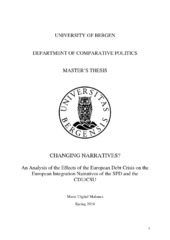| dc.description.abstract | With this thesis I aim to investigate the effects of the European debt crisis on the European Integration narratives of political parties. Taking an actor centred view on European integration, a qualitative analysis of the narratives in election manifestos from 2005, 2009 and 2013 for the German political parties the SPD and the CDU/CSU is conducted. The analysis is guided and structured by a typology made up of three dimensions: legitimation, identity and projection. The typology draws on multiple theories; theories on political narratives; theories explaining European integration both in terms of interests and norms; theories on identity formation and the construction of otherings. The analysis shows that a few changes do appear as a likely result of the European debt crisis. The CDU/CSU shifts their cognitive narrative from one expressing the usefulness of European integration for Germany, to one where Germany is narrated as useful to European integration. This narrative also appears to express some patriotic sentiment. Coupled with an identity narrative with an increased focus on national identity, this could indicate a loss of enthusiasm for European integration. The SPD's projective narrative changes from one expressing support for a supranational European Union, to one expressing support for a federal European Union, likely as a response to some of the perceived weaknesses exposed in the structure of the European Union by the debt crisis, although it may also be argued that this shift is a continuation of previous narratives. In addition, the SPD's narrative becomes less supportive of EU enlargement. The analysis also exposes a few significant changes that cannot be attributed to the European debt crisis, indicating a further need for research into factors influencing narrative and policy change on European integration. Beyond these few party specific and rather isolated changes, the results of the analysis indicate that the narratives on European integration are fairly resilient to change in terms of overall content and position. The most significant change occurring in the narratives of both political parties is the expansion and clarification of arguments, likely in order to meet increased interest in, and debate about, European integration in the electorate. As such, the results of this thesis also seem to offer support for the theory suggesting a move from permissive consensus to constraining dissensus in European electorates. | en_US |
